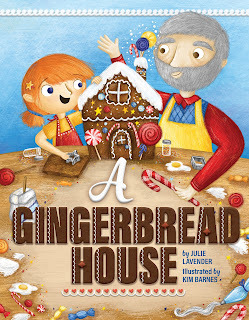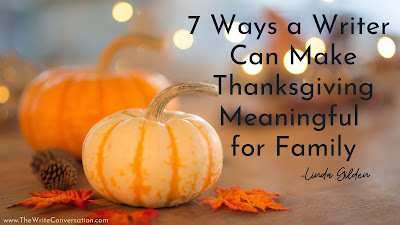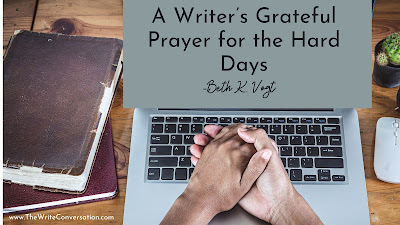Edie Melson's Blog, page 33
November 17, 2024
The Best Concepts of Write To Market

by Karen Whiting @KarenHWhiting
In Acts 17, as Paul strode around Athens, seeing many idols troubled him. He started preaching as he normally did and that brought a lot of contention and he ended up defending himself to the city council. At that point he changed his preaching. He spoke about the statue to the unknown god and said he came to share about that God, the one who created the world. They listened. Some believed while others did not, but they were no longer opposed to his preaching in Athens. Paul spoke to the market/audience when he connected to what they knew that interested them. He used a preach to the market approach.
Some writers interpret write to market as finding a trend and writing in that genre, essentially copying the style of a successful book. It appears to develop a formula for a book. Chasing trends is not fun since they change, does not stay in the author's voice, and is not guaranteed to make money.
But the idea of writing to market, with the market being readers, beckons writers to understand what their readers like, especially in the genre that like to write in. This connects the reader to the author's words to spread the message of the book and also drives up sales. It may mean tweaking our approach like Paul did, or using language the reader understands. Jesus used imagery that people understood, like a fig tree or a lost lamb. His message did not change, but he used words and stories that listeners liked.
However, an author still needs to have a wide enough readership for good sales. If your book is on grief during a specific disaster it is more narrow then if you expand it to natural disasters in general. Think of how to connect the message to more people, with the core group still being the ones you most want to reach.
Understanding the reader means discovering what they really want. In Harry Potter it's not just about magic and potions but it focuses a wimpy kid who overcomes his past and realizes his potential. It's a basic underdog story with lots of special effects. Check out some ideas to understand your readers.
Ideas to Understand the Reader
Listen
Talk to your readers when you speak, online, and one-on-one. Develop an avitar for the ideal reader. That means creating a complete description of a reader including economics, interests, habits, dress style, and more.
Listen to feedback on Best and Worst Sellers
Search the best sellers and worst sellers in your genre and read the reviews. What do people like and what don't they like. Notice the contents of the best sellers. For tween books, it generally means the contents include weird facts and some humor. For teen books it might connect to anxiety, the need be noticed as more grown up, and interests they like such as fashion or sports with tips. Follow some top sellers to see how they relate to their readers. It will come across in increased followers.
Rankings and Sales Info
In any genre see what it takes in sales to reach the top. Use the free amazon rank calculator https://kindlepreneur.com/amazon-kdp-... to check out number of book sales to make the top. Some best sellers may be in a small category and only need a few books to sell. That shows it's more niche and not a large category. So, there won't be as many readers.
Readers You Most Want to Reach
Think of how you believe needs the book. Do you know someone like that? Write for that person and, if you know someone who reflects that person, stay in touch.
Join Your Readers' Groups
Listen in, chat, and ask questions. They will be authentic.
Examine Your Own Sales
Some books do better than others. Ask yourself what set the better seller apart? Was it the content, the marketing, the timing, the felt need in general? If it was content and felt need then you had a good match to the market. If it was marketing, did that attract readers according to the felt need, or promote the book's benefits, to connect with the ideal readers?
Check the Catalogues
Read publisher's catalogues and see how they promote and describe a book. They know their buyers and market to them. Note the language, selling points, and figure out who they are targeting as readers.
Love Your Readers
Write for people you love as you will more easily use a voice they like. This is very true for writing for children. They know when someone is lecturing them as opposed to enjoying engaging with them.
Start a Focus Group
People pre-reading and reading what's not edited give feedback as you write. That's when they can point out what does and doesn't work for them as readers.
Paul wrote about connecting and relating to his audience:,
To the weak I became weak, to win the weak. I have become all things to all people so that by all possible means I might save some. I do all this for the sake of the gospel, so that I may share in its blessings. 1 Corinthians 9:22-23
We know Paul wasn't selling out, but he was passionate about people and loved them enough that he wanted them all to know Christ.
TWEETABLEThe Best Concepts of Write to Market from @KarenHWhiting on @EdieMelson (Click to Tweet)
 Karen Whiting (WWW.KARENWHITING.COM) is an international speaker, former television host of Puppets on Parade, certified writing and marketing coach, and award-winning author of twenty-seven books for women, children, and families. Her newest book, The Gift of Bread: Recipes for the Heart and the Table reflects her passion for bread and growing up helping at her grandparent’s restaurant. Check out her newest book Growing a Mother’s Heart: Devotions of Faith, Hope, and Love from Mothers Past, Present, and Future. It's full of heartwarming and teary-eyed stories of moms.
Karen Whiting (WWW.KARENWHITING.COM) is an international speaker, former television host of Puppets on Parade, certified writing and marketing coach, and award-winning author of twenty-seven books for women, children, and families. Her newest book, The Gift of Bread: Recipes for the Heart and the Table reflects her passion for bread and growing up helping at her grandparent’s restaurant. Check out her newest book Growing a Mother’s Heart: Devotions of Faith, Hope, and Love from Mothers Past, Present, and Future. It's full of heartwarming and teary-eyed stories of moms.Karen has a heart to grow tomorrow’s wholesome families today. She has written more than eight hundred articles for more than sixty publications and loves to let creativity splash over the pages of what she writes. She writes for Crosswalk. Connect with Karen on Twitter @KarenHWhiting Pinterest KarenWhiting FB KarenHWhiting.
Published on November 17, 2024 22:00
November 16, 2024
Writer, Your Words Matter

by Tammy Karasek @TickledPinkTam
Often, we hear we’re to walk in obedience if we believe God has called us to write. I don’t think anyone of us would dispute that fact. In various times during our writing path, we may have self-doubt, lose confidence in our ability or wonder if we misunderstood the nudge back when we started down this road. I don’t know of any writer who hasn’t expressed these issues as troublesome at some point.
This particular year, all of the above popped through my mind off and on at some point. I’ve talked to writer friends who’ve felt the same way, too. My year has brought much to think about and a lot of extra time to pause and reflect on various changes that have come my way in my life. I’ve had to make some major changes or maybe some pivots here and there. Many changes that quite possibly should have been made anyway.
I’ve heard various comments from writerly friends of feeling lost, confused and that there’s nothing we can do. But I’d like to throw out a suggestion to that last statement. Instead of choosing to not do anything or not try, how about you do what you can do?
Great advice, right? But, like what?
As a writer, we are positioned in a perfect time to share the hope of Jesus. People have more time to read. More are searching for answers and suggestions. Like Queen Esther says in one on my favorite verses in the Bible:
“And who knows whether you have not come to the kingdom for such a time as this?” Esther 4:14 ESV
God has placed us where He wants us to work at building His kingdom and doesn’t owe us an explanation. We don’t have to like what’s happening, but we have the choice of what we’ll do with our situation. We can sit and pout in our chair or we can work with what we have.
I believe we are called as writers for such a time as this. This coming year—and even right now—is the perfect time for us, writing from a Christian worldview, to be sharing the good news of the gospel in every way we can in anything we write. Whether we’re writing blog posts, articles, or books, now is a great time to share truth with whoever will read our words. When we pen the words given to us from God, we can have the confidence He will put them in front of whoever He wants to see them. We need only to trust His timing.
There are so many hurting people around us due to the many changes and circumstances of this year that need encouragement and hope. As writers and believers, we have the ability to share both with them. We can write those words to be published in various sources. Those sources can be the obvious of books, blog posts and articles, but let’s not forget the handwritten notes, emails and social media posts, too. We might not be able to walk door to door and share, but we can certainly reach far and wide with our written pieces to be found by someone searching for hope. Someone may be searching for an answer to a question that you’ve written about. Another may be encouraged to push through a rough patch in their life where you’ve shared actionable steps to keep on, keeping on.
Writer friends, these next couple of weeks will be hard for so many this year. Holidays usually bring their own problems of sadness, depression, split families, loneliness and more. This year may be harder for so many reasons.
I’d like to encourage you to pick up your pens, or turn on that computer, and share the love of Christ to those around you. Don’t worry about whom the piece is for, write it. Share it where you can. Be someone who shares the gospel to toss some light in our dimly lit present world. Don’t think your single light won’t matter, it will.
Close your eyes and imagine this. You’re up in the space station and you look out of the window. You sort of see this itty-bitty candle-flame flicker—it’s one writer’s words. You look away, then glance down again and there are more little blips of light coming from all over the earth. No big deal, so you move away from the window. Your curiosity gets to you, and you have to come back to glance back down to earth. Each of those single flames representing one writer who boldly sent their words out to the world, have now blended with the other writers’ flames and covered the earth with a vibrant light from all over that huge ball.
So, you think you can’t do anything? I would say to you—do what you can with your calling. Write and share hope. Write about the One who brings Hope.
Your words matter.
Let’s chat—what would you add to the above suggestion of write to share hope. Please share below.
TWEETABLEWriter, Your Words Matter thoughts from author @TickledPinkTam on @EdieMelson (Click to Tweet)
 Tammy Karasek uses humor and wit to bring joy and hope to every aspect in life. Her past, filled with bullying and criticism from family, drives her passion to encourage and inspire others and give them The Reason to smile. She’s gone from down and defeated to living a “Tickled Pink” life as she believes there’s always a giggle wanting to come out! A writer of Romance—with a splash of sass. She’s also The Launch Team Geek helping authors launch their books and also a Virtual Assistant for several best-selling authors. Don't miss her recent book, LAUNCH THAT BOOK, just released in November.
Tammy Karasek uses humor and wit to bring joy and hope to every aspect in life. Her past, filled with bullying and criticism from family, drives her passion to encourage and inspire others and give them The Reason to smile. She’s gone from down and defeated to living a “Tickled Pink” life as she believes there’s always a giggle wanting to come out! A writer of Romance—with a splash of sass. She’s also The Launch Team Geek helping authors launch their books and also a Virtual Assistant for several best-selling authors. Don't miss her recent book, LAUNCH THAT BOOK, just released in November. Her work was also published in a Divine Moments Compilation Book—Cool-inary Moments. She’s also the Social Media Manager for the Blue Ridge Mountains Christian Writers Conference, Founding President and current Vice-President of ACFW Upstate SC, and Founding President of Word Weavers Upstate SC. She’s a writing team member for The Write Conversation Blog, Novel Academy, MBT Monday Devotions, The Write Editing and more. Connect with Tammy at HTTPS://WWW.TAMMYKARASEK.COM.
Published on November 16, 2024 22:00
November 15, 2024
Writers, Get Your Social Media Ready for the Holidays with 29 Ideas to Share

by Edie Melson @EdieMelson
The holidays are upon us and so is the holiday rush. While this time is filled with fun, sometimes it can be hard to keep up with a normal routine. Instead of stressing, look at this list for quick and easy social media updates to share!
These 29 tips are divided into three sections—things we can do now and share later, things we can share on the fly, and things we should avoid sharing.
Things To Do Now and Share Later1. Keep a running list of quotes that inspire you.
2. Use the FB save option and bookmark updates from others that you can share later.
3. Make a list of open-ended questions you can ask.
4. Bookmark and save funny videos to share later.
Things to Share on the Fly5. People love to complain about the weather. So share what the weather is doing in your area and ask for others to share their info.
6. Post a link to music. You can tie it to what you’re writing and get extra interest. For example, when I’m working on my Steampunk novel, I write listening to the Pandora station, Lindsey Stirling. When I’m working on my Christian living manuscript, I love to have on a station from Warren Barfield.
7. Share a picture of where you’re working. I’ve noticed that my friends and followers love it when I share pics of my screened in back porch.
8. Take a pic while you’re out shopping. Many stores will monitor mentions and they may share or like your update.
9. Post a Bible verse that spoke to you recently—the more recent the better.
10. We’re all more than just writers, capitalize on that and share a hobby or passion that gives your readers a better all-round picture of you as a person.
11. We all feel overwhelmed. So share something you’re doing that helps calm the chaos.
12. Post a link to a recent Amazon review you wrote for another author’s book.
13. Issue a challenge. Here are some ideas: 3 Things you’re thankful for.Move more.Random act of kindness.
14. Share a favorite recipe. Or ask for a recipe suggestion.
15. Or if time doesn’t permit, ask for suggestions for something quick to fix for dinner.
16. Look at the calendar for inspiration and share a silly holiday. I recommend visiting Today is:International Wiper DayNational Button DayNational Fast Food Day
17. Everyone loves movies. List one of your old favorites, or ask for opinions about a recent release.
18. We’re writers and authors, don’t forget to share what’s on your To Be Read list.
19. Pets are always a great way to connect. If you have a furry friend, that’s a great way to connect on the fly. Share a funny story, a picture, or ask a question.
20. Everyone is engaged on social media. Ask for opinions on favorite networks and what updates people like to read most.
21. Travel is always a good topic. Share places you’ve been and places you’d like to go.
22. Share a quick meme. I love to use the WordSwag app on my phone to make fast memes while I’m out and about.
23. Don’t be afraid to be real on social media. If you’ve had something funny happen to you, share it. People trust those who don’t take themselves too seriously.
24. Always be aware of the seasons and share related content. With fall coming up, get ready because I love to post pictures of the beautiful changing trees.
25. Remember the day-of-the-week hashtags. For example, Thursday is TBT (Throw back Thursday). These are great conversation starters.
Things to Avoid Sharing26. Stay away from political rants. Yes, most of us have options. If you choose to express them, make sure they’re not inflammatory—unless you’re trying to build a platform as a political activist or political writer.
27. Don’t share anything derogatory about another person, brand, or situation. Trust me when I say that you will NEVER regret being nice. Things shared on social media will stay on social media, so avoid the negative posts.
28. Avoid the poor-pitiful me post. This isn’t a legitimate request for prayer, but more on lines of: I’m having such a horrible day. I wish people wouldn’t be so mean. These are manipulative posts meant to elicit sympathy and get us to ask more questions.
29. I recommend you NOT share times when you’re away from home. Post vacation pictures when you return and don’t give burglars an open invitation.
This list is just a start. Truthfully, it could go on forever. Now it’s your turn to add your favorite go-to social media updates. Be sure to leave your thoughts and suggestions in the comments section below.
Don’t forget to join the conversation!Blessings,Edie
TWEETABLEWriters, Get Your Social Media Ready for the Holidays with 29 Ideas to Share from @EdieMelson (Click to Tweet)
 Edie Melson is a woman of faith with ink-stained fingers observing life through the lens of her camera. No matter whether she’s talking to writers, entrepreneurs, or readers, her first advice is always “Find your voice, live your story.” As an author, blogger, and speaker she’s encouraged and challenged audiences across the country and around the world. Her numerous books reflect her passion to help others develop the strength of their God-given gifts and apply them to their lives.Connect with her on her WEBSITE, through FACEBOOK, X (FORMALLY TWITTER) and on INSTAGRAM.
Edie Melson is a woman of faith with ink-stained fingers observing life through the lens of her camera. No matter whether she’s talking to writers, entrepreneurs, or readers, her first advice is always “Find your voice, live your story.” As an author, blogger, and speaker she’s encouraged and challenged audiences across the country and around the world. Her numerous books reflect her passion to help others develop the strength of their God-given gifts and apply them to their lives.Connect with her on her WEBSITE, through FACEBOOK, X (FORMALLY TWITTER) and on INSTAGRAM.
Published on November 15, 2024 22:00
November 14, 2024
Applying "Just Do It!" to the Writing Life

by Crystal Bowman
"Just Do It" is one of the most iconic and effective advertising taglines of all time. These three simple words—the slogan for Nike athletic shoes—embody the essence of motivation, ambition, and perseverance. It encourages sideliners to get off the bench and into the game. The slogan was introduced in 1988 and propelled Nike from a footwear contender to a global sports company with universal recognition.
How JUST DO IT Applies to Writers as Well as Athletes:
MOTIVATION
Motivation is the driving force behind our actions and goal-oriented behaviors. What motivates you to write? Is it something you have always wanted to do, or has a recent experience motivated you to share your story? Have teachers, friends, or other writers told you that you should write for publication because they enjoy reading your words? Maybe you have attended a writers’ conference where you were energized by surrounding yourself with other writers. Or perhaps you have been writing for a while and those opportunities have propelled you to keep going and write more.
Whatever motivates you to write—Just Do It!
AMBITION
Ambition is a strong desire to do or to achieve something, typically requiring determination and hard work. The writing and publishing process is not for wimps. It takes years of learning, training, and lots of practice, just like anything else that is worth pursuing. If you believe God has given you the ability and desire to write, then you need a “go for it” mentality to go after what that desire.
Do you have the desire to write? Just Do It!
PERSEVERANCE
Perseverance is a continuous effort to do or achieve something despite difficulties, failure, or opposition—and writers face plenty of that! As you submit your work to publishers you may face roadblocks and “no thank yous.” As your published articles, stories, blogs, or devotions reach readers, you may face criticism and negative reviews. But you may also receive contracts, positive reviews, and awards if you persevere.
The average author spends years trying to get a contract, and if they do, it can take another 1-2 years (or longer) for the book to be published. The average author sells about 250 copies of their book the first year. The New York Times bestselling books are few and far between and often written by celebrities.
BOTTOM LINE
If you have motivation, ambition, and perseverance, then don’t let anything stand in the way of your dreams. You know the saying: If it were easy everyone would do it.
So, writers—Just Do It!
TWEETABLEApplying "Just Do It!" to the Writing Life from author Crystal Bowman on @EdieMelson (Click to Tweet)
 Crystal Bowman is an award-winning, bestselling author of more than 100 books for children and families. She also writes lyrics for children’s piano music and is a monthly contributor to Clubhouse Jr. Magazine, Arise Daily, and Christian Children's Authors. She enjoys coaching children's writers as well as teaching at writers conferences. When she is not writing or speaking, she likes going for walks and spending time with her huggable grandkids. She and her husband live in Michigan and Florida and try to avoid snowstorms.
Crystal Bowman is an award-winning, bestselling author of more than 100 books for children and families. She also writes lyrics for children’s piano music and is a monthly contributor to Clubhouse Jr. Magazine, Arise Daily, and Christian Children's Authors. She enjoys coaching children's writers as well as teaching at writers conferences. When she is not writing or speaking, she likes going for walks and spending time with her huggable grandkids. She and her husband live in Michigan and Florida and try to avoid snowstorms.WWW.CRYSTALBOWMAN.COMWWW.FACEBOOK.COM/CRYSTAL.BOWMANWWW.FACEBOOK.COM/CRYSTALJBOWMANWWW.INSTAGRAM.COM/CRYSTALBOWMANAUTHOR
Published on November 14, 2024 22:00
November 13, 2024
The Birth of a Book

by Julie Lavender @JLavenderWrites
Arrival Date: October 29, 2024Weight: 11.5 ouncesLength: 10 inches X 8 inches X .5 inchesHair color: ginger and gray
Don’t you love how authors call releasing a new manuscript “birthing a book baby”? I think it’s quite a fitting analogy. The scenario became even more personal for me when both of my daughters gifted us with newborn grandbabies right smack dab in the midst of the birth of my book baby, A Gingerbread House.
My daughters had dreamed of becoming moms, probably since my sweet girls pretended to mother their stuffed animals. They made quite convincing pet-mamas.
I, too, had a dream. For more than three decades, I dreamed of publishing a children’s picture book. I tried, but it wasn’t meant to be. God led me down a different path. He blessed me with contracts that included magazine articles, newspaper articles, compilation acceptances, and eventually, books for homeschooling families, parents, and moms.
During this time, one daughter suffered a miscarriage and years of infertility. The other daughter wanted so badly to celebrate a Mother’s Day. Her desire was answered without struggles or drama when she became pregnant quickly.
As a children’s picture book writer wannabe, I weathered years of rejections and “not now,” “doesn’t work,” and no answers at all. But when I received a “yes,” it happened quickly without struggles or drama. Well, I take that back—my yes after all those years came with a “now wait two-and-a-half more years before snuggling on the couch with your book baby.”
I knew the wait would be worth it. When the publisher first leaned over and whispered in my ear during an evening session of the Blue Ridge Mountains Christian Writers Conference that she wanted my book, I felt like shouting my excitement from the mountaintops. I was expecting a book baby!
Elation, joy, and giddiness followed. When I signed the double lines of the contract, reality sunk in. I would soon birth a book baby. A children’s picture book, book baby. How would I stand the wait?
Jenifer and Jessica both dealt with fatigue and nausea in the first trimester. I felt writer’s fatigue – the joy of an impending arrival, but exhaustion from the long wait. Then the queasiness set in – would I meet my publisher’s expectations? Could I meet the demands of being a children’s picture book author? Would children like my book?
The middle months rocked along for both girls and my gingerbread world. The publisher and illustrator stayed busy doing their thing to bring my book baby to life.
In the early days of the third trimester, Jenifer started having false labor contractions. Not terribly painful, but uncomfortable, disconcerting, and miserable nonetheless.
I also experienced sometimes uncomfortable but not necessarily painful book contractions with edits, endorsement-seeking moments, and illustration picture-pondering.
Unlike most book launches, I had just as much uncertainty about my book baby’s arrival as my girls did with the arrival of their babies. My book had the misfortune of being stuck on a ship when longshoremen up and down the east coast went on strike, backing up boats offshore for miles.
My publisher couldn’t give me a due date.
When the strike ended, my book was on the move again. Yet it was a false start, because many ships needed unloading, and warehouse arrival remained unsure.
Jessica and Dawson created their own false start, when they trekked to the hospital with her painful – yet unproductive – contractions. Two days later, however, the contractions did their job, and baby Danae launched into the world, six weeks after her cousin Maverick had arrived. I was one proud grandmommy!
Eighteen days later, A Gingerbread House , made her appearance into the world, with a sweet ginger-haired girl on the cover accompanied by her gray-haired grandpa.
I was one proud book baby parent. I’d waited more than three decades for this book baby. A dream come true.
God’s timing is always best.
Though a book baby can never compare to the precious little ones God gave us in the midst of my book launching, the weight—and wait—of carrying a book that has the potential to change a child’s life is heavy and significant. It’s a moment I don’t take lightly.
I’m humbled and grateful for new life, in bassinets and bookstores.
TWEETABLEThe Birth of a Book from @JLavenderWrites on @EdieMelson (Click to Tweet)
 A Gingerbread Houseby Julie Lavender
A Gingerbread Houseby Julie LavenderA little girl and her grandfather make sweet memories creating and decorating a gingerbread house.
But wait—something’s missing!
Will the pair of bakers figure out what’s missing from their masterpiece?
Written in rhyme, the rollicking story takes the creation from dough to completion in a tale that tantalizes all five senses and brings joy to the two bakers, as well as the readers!
 Julie Lavender is thrilled to announce the birth of her newest book baby, A Gingerbread House, a picture book published by End Game Press. She’s also pretty excited about two new grandbabies’ births, making her grand total of grands equal three. Julie is grateful this Thanksgiving season for all the Lord’s blessings in her family life and writing life.
Julie Lavender is thrilled to announce the birth of her newest book baby, A Gingerbread House, a picture book published by End Game Press. She’s also pretty excited about two new grandbabies’ births, making her grand total of grands equal three. Julie is grateful this Thanksgiving season for all the Lord’s blessings in her family life and writing life.
Published on November 13, 2024 22:00
November 12, 2024
7 Ways a Writer Can Make Thanksgiving Meaningful for Family

by Linda Gilden @LindaGilden
It seems with every year that goes by, when November comes around, I feel more thankful than the year before.
This is one of those cases like when I go to the doctor for a check-up and ask a question about some new ache or pain. My doctor’s response usually begins with the same phrase, “Well, at your age…”
But the way I feel about Thanksgiving has very little to do with my age. It is a matter of genuine thankfulness. Every year as life moves on up the number scale, I feel more thankful to still be here using the writing gifts God has given me. I love the privilege of watching my family grow and making memories with them from year to year. And, most importantly, it seems that the time I spend thanking God for the privilege of continuing to be able to share His love with others through words. “Give thanks unto the Lord, for He is good. His love endures forever” Psalm 136:1 (NIV). As we continually give thanks to God, we become closer to Him, and our relationship becomes stronger.
Here are a few suggestions for writer families to help them intentionally make new memories and keep their focus on ways to keep God at the center of our thanks
1. Create a Family Thankful Tree: Cut a tree trunk out of brown construction paper and tape to the wall with painter’s tape. Have a basket of colorful leaves (also from fall colors of construction paper) and markers. When people come in, have them write someone or something they are thankful for on a leaf and tape it on the tree. Call attention to the tree during dinner and give a few people a time to say why they are thankful for whatever is written on the leaf.
2. Ask the Question: What is one thing you are thankful for this year? If you love to provide favors for your festive dinner, give each person a small journal so they can record the things they are thankful for during the coming year. As my children grew up, I wrote in my journal the cute things they did or said and why it made me so thankful for them.
3. Family Storytelling Time: Have a time of directed story telling. For example, ask Grandpa how they celebrated Thanksgiving when he was a little boy. Did they eat turkey? Or was it just a regular holiday meal with extra folks there? Ask everyone if they can remember a story of gratitude during the previous year.
One year when I had broken my foot, my children and grandchildren planned a surprise July 4 party. We had our July 4 dinner then talked about how thankful we were for our Armed Services personnel who protected our country. Their Grandpa told a story about when he was in the service, which gave them a better understanding about what it was like to serve our country through the military.
The kids had me hobble to the den recliner and sit down. All the family went in another room, and I was to just sit there and wait and wait and wait! All of a sudden, the door opened, and patriot music began to blare. Here they came, all dressed up in red, white, and blue, carrying balloons on a stick in the same patriotic colors, and paraded around the recliner, laughing and giggling. Best parade ever and a wonderful memory. These stories can provide lots of fodder for writing family stories and inspire other articles as well.
“Enter his gates with thanksgiving and his courts with praise; give thanks to him and praise his name. For the Lord is good and his love endures forever; his faithfulness continues through all generations” Psalm 100:4-5 (NIV).
4. A Thanksgiving Family Prayer: Be mindful as you say the prayer before your meal to mention everyone’s name in the prayer. Mention those who write, those who have the gift of encouragement, those who are helpful, etc. Thank God they are part of the family and for the special gifts He has given them. Make sure to include friends and others who are present. If your family is not one who likes to pray aloud, write out short prayers for everyone to read when it is their turn.
“Let the peace of Christ rule in your hearts, since as members of one body you were called to peace. And be thankful. Let the message of Christ dwell among you richly as you teach and admonish one another with all wisdom through psalms, hymns, and songs from the Spirit, singing to God with gratitude in your hearts. And whatever you do, whether in word or deed, do it all in the name of the Lord Jesus, giving thanks to God the Father through him.” Colossians 3:15-17 (NIV)
5. Giving Back through Your Gifts: Thanksgiving is often thought of as a time of generosity. Think of a way you can give to others during this season. If you are a writer or want to encourage your children to be, write notes to family or friends you haven’t seen in a long time, especially seniors or those who can’t get out much. Or donate some books you have completed to the library. Some areas have many writers in them but no one to help them learn. Volunteer your time at a church or community center or school to help writers in their area. If your children or Mom like to bake, make cookies for a neighbor. For many just a short visit is a tremendous blessing.
6. Family Vision Board for the Year Ahead: Very soon after Thanksgiving comes the beginning of a new year. What are your goals for when we flip over a page to the next year? While Thanksgiving often focuses on the past, it can also be a time to look ahead with gratitude for what’s to come.
Each family member can create a vision board of their hopes, dreams, and prayers for the coming year. Purchase an individual white board for everyone who attends Thanksgiving dinner at your house. Let them record their goals and dreams for the next year It might help them to divide the board into fourths so they actually have a deadline to keep in mind. For writers, use this as an exercise to visualize their own goals for articles and book projects.
7. Gratitude Meditation for Writers: Each day when you begin your writing, spend a few minutes in prayer, talking to God about the project you will work on that day. Writing is an isolated activity, and this will help you feel God’s presence as you work. Take frequent breaks and walk around the house for five or ten minutes and you will feel more energized when you get back to work. Put your favorite verse on your computer so when your eyes need a break from the computer screen, you can focus on God’s Word and how He has called you to be a writer and share His message with others. Gratitude can help you stay focused on why you write and your purpose in doing so.
“Thanks be to God for his indescribable gift!” 2 Corinthians 9:15 (NIV)
TWEETABLE7 Ways a Writer Can Make Thanksgiving Meaningful for Family @LindaGilden on @EdieMelson (Click to Tweet)
 Linda Gilden is an experienced, bestselling writer, speaker, award-winning editor, marketer, and speaking coach, ghostwriter, and writing coach. Author of 40 books and 2,000+ magazine articles, Linda appreciates a great story. She believes with our stories, we can change the world one word at a time and loves to encourage others to do that through writing coaching and personal tutoring. Her newest book was released in November: TRADING SHADOWS: EXCHANGING A LIFE OF SECRETS, FEAR, AND DOUBT FOR A LIFE OF FREEDOM WITH THE ALMIGHTY.
Linda Gilden is an experienced, bestselling writer, speaker, award-winning editor, marketer, and speaking coach, ghostwriter, and writing coach. Author of 40 books and 2,000+ magazine articles, Linda appreciates a great story. She believes with our stories, we can change the world one word at a time and loves to encourage others to do that through writing coaching and personal tutoring. Her newest book was released in November: TRADING SHADOWS: EXCHANGING A LIFE OF SECRETS, FEAR, AND DOUBT FOR A LIFE OF FREEDOM WITH THE ALMIGHTY.
Published on November 12, 2024 22:00
November 11, 2024
The Benefits of Brainstorming for Writers: Part 1

by Cindy K. Sproles @CindyDevoted
Brainstorming—who needs it? Right? But for the record—we all need to brainstorm with a like-minded person from time to time. Brainstorming is a valuable skill that can help a writer in a pinch or help develop an already “in play” plotline.
I have a friend who is a gifted brainstormer. Give him one line and his brain runs in a hundred different directions. I gave him my idea of a Civil War soldier with a secret and a box of gold. That was all it took before he’d spit out numerous ideas in minutes—one of which I used.
The problem is that most don’t understand what this strange bird is much less how brainstorming can benefit them. Let’s begin with the obvious. Not everyone is gifted as a brainstormer. It has to do with how the creative mind works. Just like some are amazing descriptive writers, others can churn out story after story in no time. If your gift is not at the top as a brainstormer, it doesn’t mean your input isn’t just as important. In this two-dpart blog we’re going to first look at the possibilities of brainstorming and then next month, we’ll delve deeper into some techniques. (Yeah, I know, who’d have thought there were techniques?) But to begin, here are a few tips on brainstorming that will help you understand how the process works.
Types of Brainstorming for Writers
The overachiever brainstormer: That’s my give-him-one-line-and-he-spits-out-a-zillion-ideas friend. Early in our writing careers, I frequently went to him to brainstorm. After a few sessions of back and forth, I began to think I wasn’t the least bit creative. It took some time for me to understand that I really was very creative. Just in a different way. Where my writer friend could conjure up multiple ideas, my gift was taking the idea into a descriptive form. We’re all different. If you are not the lead dog in the brainstorming race, refer to your talents. For me, it was taking the idea and twisting and turning it into the unexpected. I learned just how important it was to bat ideas back and forth with my overachiever brainstorming friend. He could rearrange a plot and pull me out of a writing corner in no time flat. Point: Don’t compare your talents to the overachiever brainstormer. Each one of us is unique and brings a necessary component in the process to the table. It takes practice to learn to banter in the brainstorming process. Be patient. You’ll find your niche and fit right in.
Don’t be afraid to brainstorm: Brainstorming can make a good story, great. So often, new writers feel extremely possessive of their ideas. I hear it frequently. “Someone may take my idea.” Well, I suppose they could, but I refer you back to the Book of Ecclesiastes, and the reminder the writer of the book gives us. There is nothing new under the sun. There is nothing we can do to prevent someone from choosing to be dishonest, no more than we can prevent the rain from falling. Unless you are keeping some shady company, the overwhelming number of trustworthy writers far exceeds those who are not. Choose good peers. Find a great critique group, or buddy up with that one writer who is great with ideas. Brainstorming is a tool that should be in your toolbox and one that is used. As I stated earlier, brainstorming can make a good story great. Your input is important in this process so don’t be afraid to share your ideas and then take them up a notch.
I can just use AI to brainstorm: Yep. You can. AI is a great tool when used properly. Simply type in your plot points, tell the AI you need two or three scenarios and press enter. AI will spit out a couple of ideas. The problem is that you can’t depend on the suggestions to fit into your full story. And, with AI, you lose the personal aspect of one writer striking up an idea and being able to “what if” it. AI is a great tool but use it with caution. Remember, your creativity long outweighs a computer-generated idea that doesn’t understand the feel of your story. The added plus with your writer friends is the relationship factor. There is much more value in a person-to-person relationship versus your local AI.
The Importance of What Ifs: There is nothing better than laying an idea on the table and your writing buddy says, “What if…” They give their idea, and that idea sparks a “what if…” Folks, that is brainstorming. It’s learning to “what if” situations. Let your imagination take an idea and then reimagine it. Some of my best plot twists have come from a writer saying, “But what if…”
I recently contacted a writer friend to run my changing plot past her. I gave her some of the historical research I’d found, which sparked a memory in her. We began to bounce what-ifs back and forth, each one sparking a new idea until we found the “one.” Suddenly, the tiny piece that made me uncomfortable in the story came to light and everything fell into place. Taking the time to brainstorm with her saved me hours of wondering, worrying, and writing in the wrong direction.
Getting You Out of a Writing Corner: It’s so easy to start down a trail writing in a story and suddenly you’ve written yourself into a box with no way out. I picture this like I’m painting a floor in a room. Suddenly I look up, the door is on the opposite side of the room and I’m in a corner surrounded by wet paint. It happens to writers. A plot that looked so good, pushes you into a corner and becomes unresolvable. Brainstorming can get you out of the corner. Sometimes it just takes other eyes to see the overall picture. Our heads become locked in on a scene or plot that we not only love, but we become so involved in that we forget in its development that we have to add doorways hints, or situations that allow us to get past the scene we’re in. Brainstorming helps find those exits and it helps make the resolve believable. We may find a way out on our own but it’s so pushed that the resolve seems unbelievable to the reader. When others come in behind you and work ideas alongside you, the things you’ve missed will become clear and suddenly you can backtrack, insert, and rework. Then, there’s your answer. Never underestimate the power of two heads working together. There’s meaning to “two heads are better than one.
Finally, don’t be afraid to try something new: This is hard for many of us. We find ourselves snugged into a comfortable spot unwilling to make changes to the work we’ve done. Mary Kay Ashe, founder of Mary Kay Cosmetics once said, “Much is lost if but for a little more work.” Wiser words could have never been spoken. Learning to be open to new ideas is scary especially when it means considering changes to the labor of love we call our work in progress. Brainstorming offers us a wonderful opportunity to hone our story. But, we have to take the risk. I’ve often been asked what my best writing advice is. I would have to say it’s don’t marry your words. When you marry your words, there is no room for the unexpected. Remember, there are always better words. We simply have to be open to taking risks, opening our minds to new possibilities that can swing open the door to amazing things. You only have to be willing.
Give brainstorming a try and see what develops.
TWEETABLEThe Benefits of Brainstorming for Writers: Part 1 from @CindyDevoted on @EdieMelson (Click to Tweet)
 Cindy K. Sproles is an author, speaker, and conference teacher. Having served for a number of years as a managing editor for Lighthouse Publishing of the Carolinas and Ironstream Media, Cindy now works as a mentor, coach, and freelance editor. She is the co-founder of Writing Right Author Mentoring Services with Lori Marett and she is the director of the Asheville Christian Writers Conference. Cindy is also the co-founder of Christian Devotions Ministries and WWW.CHRISTIANDEVOTIONS.US, as well as WWW.INSPIREAFIRE.COM. Her devotions are in newspapers and magazines nationwide, and her novels have become award-winning best-selling works. She is a popular speaker at conferences and a natural encourager. Cindy is a mountain girl, born and raised in the Appalachian mountains, where she and her husband still reside. She has raised four sons and now resorts to raising chickens where the pecking order is easier to manage. You can visit Cindy at WWW.CINDYSPROLES.COM or www.wramsforwriters.com.
Cindy K. Sproles is an author, speaker, and conference teacher. Having served for a number of years as a managing editor for Lighthouse Publishing of the Carolinas and Ironstream Media, Cindy now works as a mentor, coach, and freelance editor. She is the co-founder of Writing Right Author Mentoring Services with Lori Marett and she is the director of the Asheville Christian Writers Conference. Cindy is also the co-founder of Christian Devotions Ministries and WWW.CHRISTIANDEVOTIONS.US, as well as WWW.INSPIREAFIRE.COM. Her devotions are in newspapers and magazines nationwide, and her novels have become award-winning best-selling works. She is a popular speaker at conferences and a natural encourager. Cindy is a mountain girl, born and raised in the Appalachian mountains, where she and her husband still reside. She has raised four sons and now resorts to raising chickens where the pecking order is easier to manage. You can visit Cindy at WWW.CINDYSPROLES.COM or www.wramsforwriters.com.
Published on November 11, 2024 22:00
November 10, 2024
What's a Writer to Do When We Run Out of Ideas

by Larry J. Leech II @LarryJLeechII
Blink. Blink. Blink.
Oh, that cursor. That stupid cursor. Mocking me. In the top left-hand corner of a blank Word doc.
Blank. Like my mind. On a day that I need to write.
Being a full-time freelancer for more than twenty years, my motto has been: “If I don’t work, I don’t get paid.”
With a blank mind, producing words can be difficult.
Blink. Blink. Blink.
If those blinks included a sound, I’m sure they would be loud. Very loud. Like an ’80s metal concert.
Those I enjoyed. The blinking cursor—not so much.
After five minutes or so, I might want to throw my hands up and scream, “I got nothing!” Or roll away from the desk, grinding my teeth and mumbling, “I give up.”
A blank mind can be one of the most frustrating experiences for a writer. We’re supposed to be full of ideas and the words flow so freely that we can’t type fast enough to keep up.
Until the mind goes blank.
Irritating.
Mind-numbing.
Frustrating.
But easy to overcome.
Even I chuckled at that. But it’s true.
To overcome these ‘blank’ moments, I have discovered a few things that help me get my mind in gear.
3 Tips to Help Writers to Overcome a Blank Mind
Option one: I just babble on the page. Doesn’t matter what I write, I just write. Sometimes about my feelings, other times about golf or Stars Wars. When I do this, my mind eventually wanders over to what I ‘need’ to write about that day. I don’t have a set number of words or time to jump into writing, just whatever it takes. Option two: I type in the file a prayer that centers on my struggle and ask the Lord to help me. Livin’ on a prayer, for real. I admit that I am helpless, and I can’t write without Him. Then I ask, sometimes beg, for Him to give me the words for the day.Option three: I learned that a brainstorming session with someone kickstarts my mind. Doesn’t even have to be another writer. My wife and son always offer great insight to a story idea or message. Their words and encouragement help me stop going round and round, and words start flowing from my brain into the computer.
With these three things in my arsenal, you’d think that I’d never have to deal with a blank mind.
But I do.
Until I remember to utilize one of my options.
What are some of your options for getting rid of a blank mind?
TWEETABLEWhat's a Writer to Do When We Run Out of Ideas from @LarryJLeechII on @EdieMelson (Click to Tweet)
 Editor-in-Chief at Bold Vision Books and writing coach of award-winning authors, Larry J. Leech II has spent more than forty years writing and editing. He started his career as a sportswriter in southwestern Pennsylvania where he covered prep, college, and pro sports, including the Pittsburgh Pirates and Steelers.
Editor-in-Chief at Bold Vision Books and writing coach of award-winning authors, Larry J. Leech II has spent more than forty years writing and editing. He started his career as a sportswriter in southwestern Pennsylvania where he covered prep, college, and pro sports, including the Pittsburgh Pirates and Steelers. In 2004, after 2,300 published articles, Larry moved into the book publishing industry. Since that time, he has ghostwritten 30 books, edited more than 400 manuscripts, and coached hundreds of authors through the writing and publication process. You can find him online on Twitter, Facebook, and Instagram.
Published on November 10, 2024 22:00
November 9, 2024
Don’t Be a Procrastinating Writer

by Martin Wiles @LinesFromGod
After administering their weekly spelling quiz, I stood before my sixth- and seventh-grade classes and explained the topic of their first formal essay.
As they looked at the writing on the wall (the overhead screen), groans reverberated throughout the room. "That's not our assignment for today, is it?" a few dared to ask.
Although I was not technically their writing teacher, they still received plenty of writing instruction and practice in grammar class. And since their writing teacher didn't assign essays to sixth graders—and had not yet assigned one to the seventh graders—I figured, why not?
I also thought the timing of the topic was appropriate for the final day of the nine weeks. Our private school requires AR (accelerated reading) goals for all sixth and seventh graders. Some read diligently and meet their goals early in the nine weeks. Most, especially many of the boys, put off reading until the last two weeks. Then, their pace turns frantic. They don't want a zero for a test grade or to be put on restriction by their parents. Thus, the rat race—a race for which I have little sympathy.
Why? Well, while I was growing up, Dad familiarized me with a famous saying about procrastination: "Don't put off until tomorrow what you can do today." I suppose he thought it was biblical and practical—and it is. Jesus said, "We must quickly carry out the tasks assigned us by the one who sent us. The night is coming, and then no one can work (John 9:4 NLT). God's work is urgent.
I gave my students my ditty for writing an essay—it also works for other types of writing: "Tell me what you're going to tell me, tell me, and tell me what you told me." The saying takes care of the introduction, body, and conclusion—something devotions, short stories, plays, articles, research papers, novellas, and books all need. And since I'm a planner, not a pantster, I love organization.
Yes, I wanted them to learn the art of writing well, but the more important lesson I wanted them to grasp involved procrastination. We writers often struggle with this, too, and it houses dangers.
For my students, the dangers might only entail a lousy grade or parental restriction. For writers, procrastination could mean missing a writing contest, missing a crucial deadline—which might impact future writing opportunities—missing an appointment with an agent or editor, missing sleep we would have enjoyed had we planned better, or many other things that could impact our writing career.
The reasons we procrastinate are as varied as the things it can cause us to miss: fear of failure or rejection, busyness, misplaced priorities, lack of energy, and stubbornness.
In academic life, we teachers impose deadlines on students, which spurs them on and hopefully teaches them not to procrastinate. Publishers, agents, and editors do the same in the writing life because they, too, have deadlines that make it essential that we writers meet our deadlines. The world of writers, editors, agents, and publishers revolves better when all do what they do on time.
God's call to write is a beautiful gift that provides us with blessed opportunities to touch the world for him. Procrastination, however, interferes with us doing our best at that. Let's write well and be good stewards of the time and opportunities God provides. Don't put off until tomorrow what you need to do today. God provides the courage and wisdom to do today what we need to do today.
TWEETABLEDon't Be a Procrastinating Writer from author Martin Wiles (@LinesFromGod) on @EdieMelson (Click to Tweet)
 Martin Wiles lives in Greenwood, SC, and is the founder of Love Lines from God. He is a freelance editor, English teacher, pastor, and author. He serves as Managing Editor for both Christian Devotions and Vinewords.net and is an instructor for the Christian PEN (professional editor’s network). Wiles is a multi-published author. His most recent book, Hurt, Hope and Healing: 52 Devotions That Will Lead to Spiritual Health, is available on Amazon. He and his wife are parents of two and grandparents of seven. He can be contacted at mandmwiles@gmail.com.
Martin Wiles lives in Greenwood, SC, and is the founder of Love Lines from God. He is a freelance editor, English teacher, pastor, and author. He serves as Managing Editor for both Christian Devotions and Vinewords.net and is an instructor for the Christian PEN (professional editor’s network). Wiles is a multi-published author. His most recent book, Hurt, Hope and Healing: 52 Devotions That Will Lead to Spiritual Health, is available on Amazon. He and his wife are parents of two and grandparents of seven. He can be contacted at mandmwiles@gmail.com.
Published on November 09, 2024 22:00
November 8, 2024
A Writer’s Grateful Prayer for the Hard Days

by Beth K. Vogt @BethVogt
November has become the month of gratitude for me. While this past year has been a challenging one, I’m certain I’m not the only writer looking back over my shoulder at disappointments or even heartaches. But as I considered today’s blog post, my thoughts became a prayer of gratefulness:
A Prayer From a Weary and Grateful WriterThank You for the hard days, God.Although it seems the difficult outweighs the good this year,Nothing overshadows your abundant grace –And perhaps that was the lesson I was meant to grasp.
Thank You for the days when writing was a slog, God.When the page was quicksand,Sucking away any attempts at originality or the slightest bit of progress,And my feeble efforts left me totally dependent on You.
Thank You for the days when comparison backed me into a corner, God.When I realized, once again, that I wasn’t as good as so many other writers,Deciding my ability was less-than,And I was reminded to look only to You for affirmation.
Thank You for the days when Imposter Syndrome caused me to cower, God.When I wondered who I was to step up and accept applause or acclaim,Certain someone would call me out as a pretender.And You told Me to stand firm in Your calling on my life.
Thank You for the days when interruptions trumped word count, God.When I didn’t meet my daily goal while my deadline loomed.Struggling with fear, wondering why I said yes to this dream,And You assured me that Your strength is always sufficient for me.
Thank You for the days when loneliness weighed me down, God.When I wished the writing life wasn’t so solitary,That it wasn’t just me and the still-blank page.And You promised me that You are with me every single moment of my days.
As 2024 winds down, I’m praying you also find reasons to be grateful, my friends.
TWEETABLEA Writer's Grateful Prayer for the Hard Days, @BethVogt on @EdieMelson (Click to Tweet)
 Beth K. Vogt believes God’s best often waits behind the doors marked “Never.” She’s authored 15 novels and novellas, both contemporary romance and women’s fiction. Beth is a Christy Award winner, an ACFW Carol Award winner, and a RITA® finalist. Her newest contemporary romance novel, Dedicated to the One I Love, released June 20, 2023. Her novel Things I Never Told You, book one in her Thatcher Sisters Series by Tyndale House Publishers, won the 2019 AWSA Golden Scroll Award for Contemporary Novel of the Year. An established magazine writer and former editor of the leadership magazine for MOPS International, Beth blogs for Learn How to Write a Novel and The Write Conversation and also enjoys speaking to writers group and mentoring other writers. She lives in Colorado with her husband Rob, who has adjusted to discussing the lives of imaginary people. Connect with Beth at BETHVOGT.COM.
Beth K. Vogt believes God’s best often waits behind the doors marked “Never.” She’s authored 15 novels and novellas, both contemporary romance and women’s fiction. Beth is a Christy Award winner, an ACFW Carol Award winner, and a RITA® finalist. Her newest contemporary romance novel, Dedicated to the One I Love, released June 20, 2023. Her novel Things I Never Told You, book one in her Thatcher Sisters Series by Tyndale House Publishers, won the 2019 AWSA Golden Scroll Award for Contemporary Novel of the Year. An established magazine writer and former editor of the leadership magazine for MOPS International, Beth blogs for Learn How to Write a Novel and The Write Conversation and also enjoys speaking to writers group and mentoring other writers. She lives in Colorado with her husband Rob, who has adjusted to discussing the lives of imaginary people. Connect with Beth at BETHVOGT.COM.
Published on November 08, 2024 22:00



